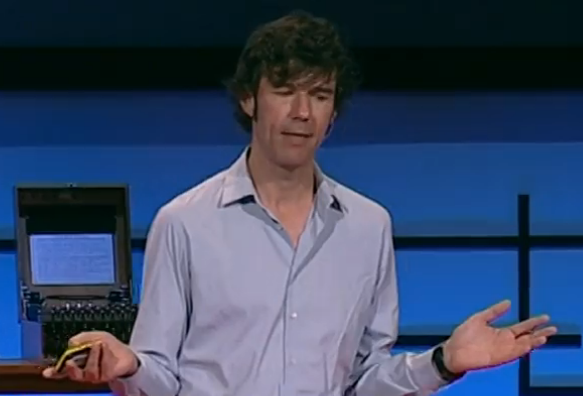In the beginning, on the first sabbatical, it was rather disastrous.
我的第一個休假初期,事情進展一點也不順利。
I had thought that I should do this without any plan,
我以為不用計劃,
that this vacuum of time somehow would be wonderful and enticing for idea generation.
空閑本身就很好,使人創新。
It was not. I just, without a plan, I just reacted to little requests, not work requests, those I all said no to, but other little requests.
但我錯了,沒有計劃,我會被動的去應付瑣碎小事,我不是指工作上的事情,那些我全拒絕了,我是指的其他瑣事。
Sending mail to Japanese design magazines and things like that. So I became my own intern.
比如說給日本設計雜志寫信,就是說,我成了給自己打下手的學徒工。
And I very quickly made a list of the things I was interested in, put them in a hierarchy,
很快,我把自己感興趣的事情列了個清單,把它們分門別類,
divided them into chunks of time and then made a plan, very much like in grade school.
分給大塊的時間,然后作個計劃,就像在小學校做的一樣。
What does it say here? Monday, 8 to 9: story writing; 9 to 10: future thinking.
計劃有什么呢?星期一8至9點:寫小說,9至10點,預想未來。
Was not very successful. And so on and so forth.
那不是很成功。等等等等。

And that actually, specifically as a starting point of the first sabbatical, worked really well for me.
而實際上,作為第一次休假的開始,這些安排很適合我。
What came out of it? I really got close to design again. I had fun.
結果呢,我又重新愛上設計了。我自得其樂。
Financially, seen over the long term, it was actually successful.
從長遠經濟角度看,我的第一個長假是成功的。
Because of the improved quality, we could ask for higher prices.
由于質量提高,我們可以設更高的價格。
And probably most importantly, basically everything we've done in the seven years following
或許最重要的是,基本上,在接下來的七年,
the first sabbatical came out of thinking of that one single year.
我們的設計意念俱源自我們休假的那一年。
And I'll show you a couple of projects that came out of the seven years following that sabbatical.
請你看看以下幾項作品,都是那個長休假之后七年設計的。
One of the strands of thinking I was involved in was that sameness is so incredibly overrated.
第一種體會是(在設計品牌時)我們過分強調一致性。
This whole idea that everything needs to be exactly the same works for a very very few strand of companies, and not for everybody else.
其實這種凡事必須完全相同的想法,僅僅能對極少數公司行得通,而并非每家公司都合適。











